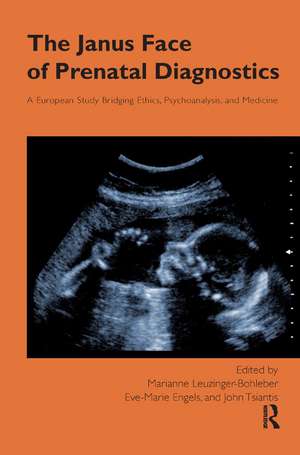The Janus Face of Prenatal Diagnostics: A European Study Bridging Ethics, Psychoanalysis, and Medicine
Editat de Eve-Marie Engels, Marianne Leuzinger-Bohleber, John Tsiantisen Limba Engleză Hardback – 27 sep 2019
Preț: 825.51 lei
Preț vechi: 996.14 lei
-17% Nou
Puncte Express: 1238
Preț estimativ în valută:
157.96€ • 165.39$ • 131.02£
157.96€ • 165.39$ • 131.02£
Carte tipărită la comandă
Livrare economică 10-24 aprilie
Preluare comenzi: 021 569.72.76
Specificații
ISBN-13: 9780367328092
ISBN-10: 0367328097
Pagini: 460
Dimensiuni: 152 x 229 x 30 mm
Greutate: 1.06 kg
Ediția:1
Editura: Taylor & Francis
Colecția Routledge
Locul publicării:Oxford, United Kingdom
ISBN-10: 0367328097
Pagini: 460
Dimensiuni: 152 x 229 x 30 mm
Greutate: 1.06 kg
Ediția:1
Editura: Taylor & Francis
Colecția Routledge
Locul publicării:Oxford, United Kingdom
Public țintă
Professional Practice & DevelopmentCuprins
Preface: Short Summary of the European Research Project EDIG -- Introduction -- Introduction and overview -- Ethics of care in prenatal diagnosis: implications of variations in law, policy, and practice in EDIG countries -- State of the art in prenatal diagnosis -- Findings of EDIG -- Empirical data evaluation on EDIG (Ethical Dilemmas due to Prenatal and Genetic Diagnostics) -- Some comments of countries that collected empirical and clinical data -- Comment A, concerning Italian empirical data -- Comment B, concerning empirical and clinical data from an Israeli perspective -- Comment C, concerning empirical data from a Greek perspective -- Interviewing women and couples after prenatal and genetic diagnostics -- Crisis intervention after prenatal diagnostics: an example -- "I'd also like to be in good hope myself for once." The highly problematic decision-making process within the framework of PND and its dependency on a sufficiently developed, autonomous female identity -- Ethical Considerations about EDIG -- Experience and ethics: ethical and methodological reflections on the integration of the EDIG study in the ethical landscape -- Moral dilemmas and decision-making in prenatal genetic testing -- The moral status of the foetus -- Prenatal genetic counselling: conceptual and ethical issues -- The interchange between psychoanalysis and philosophy in the understanding of ethical decisions -- Clinical, Medical, and Societal Implications -- A model of integrated genetic counselling (IGC): EDIG as a transformation promoter in PND -- Prenatal and genetic diagnostics and trisomia 21: a current debate of ethical and psychosocial implications with reference to Greece -- PND in a Christian and Muslim culture. The EDIG project in Thrace, Greece -- Introducing new tests in genetic diagnostics: details of some ongoing controversial discussions in Swedish media
Notă biografică
Eve-Marie Engels is full Professor of Ethics in the Life Sciences at the Faculty of Biology, as well as a member of the Faculty of Philosophy and History, at Eberhard Karls University of Tubingen. From 2001 to 2008 she was a member of the German National Ethics Council. Marianne Leuzinger-Bohleber is a training analyst in the German Psychoanalytical Association, former Chair of the Research Subcommittees for Conceptual Research, and a member of the Swiss Psychoanalytical Society. She is Vice Chair of the Research Board of the International Psychoanalytical Association, Full Professor for Psychoanalysis at the University of Kassel, and head Director of the Sigmund Freud Institute, Frankfurt/Main. Her main research fields include epistemology and methods of clinical and empirical research in psychoanalysis, interdisciplinary discourse with embodied cognitive science, educational sciences, and modern German literature. John Tsiantis is Professor of Child Psychotherapy, President of European Union of Medical Specialists Section of Child and Adolescent Psychiatry, previously Chief Editor of the EFPP Monographs book series, and President of the Hellenic Institute of Psychoanalytic Psychotherapy.
Descriere
Coping with modern technology has become a major issue of people living in the 21st century creating new chances and possibilities but also new dangers and ethical concerns. This study investigates ethical dilemmas connected to these new technologies in prenatal diagnostics, a relevant discipline in modern life sciences.
